Home > Recent Judgements > Suit For Specific Performance Doesn’t End With Passing Of Decree; Court Retains Power To Annul Decree Or Extend Time
Jan 22, 2025
INTRODUCTION
The case between Balbir Singh & Anr Etc vs Baldev SIngh (D) Through His Lrs & Ors. Etc, the Supreme Court of India reaffirmed a significant legal principle in the field of civil law. The decree for specific performance does not bring the judicial process to a close. Even after passing a decree, the court retains the inherent power to annul the decree or extend the time for compliance. An equitable remedy in contract law is specific performance where a court orders a party to fulfil their contractual obligation. More often than not, applied to immovable property cases, it gives the aggrieved party the right to compel performance rather than to claim damages. Once a decree for specific performance is passed, the parties are expected to comply with its terms within the stipulated time. However, practical challenges such as unforeseen circumstances or deliberate delays often hinder timely compliance. This requires judicial oversight to ensure fairness.
THE CONTEXT OF SPECIFIC PERFORMANCE
Specific performance is an equitable remedy in contract law where a court orders a party to fulfill their contractual obligations. Typically sought in cases involving immovable property, this remedy allows the aggrieved party to compel performance instead of merely claiming damages. Once a decree for specific performance is passed, it is expected that the parties comply with its terms within the stipulated time. However, practical challenges, including unforeseen circumstances or deliberate delays, often hinder timely compliance. This necessitates judicial oversight to ensure fairness.
KEY ISSUES
- Could the court’s retention of such powers undermine the principle of finality in judgments?
- If courts can extend time or annul the decree, does it interfere with the principle of “time is of the essence” in contracts, thus potentially incentivizing delay, or non-compliance by the parties?
- Should courts continue to exercise such oversight in enforcing decrees, or should this be left to the execution mechanism under the law?
- Does the retention of such powers by the court create a sense of imbalance, where one party might benefit from delays or judicial intervention beyond the original terms of the decree?
- Is there a risk of judicial activism where courts assume powers that might conflict with the intent of contractual parties?
JUDGMENT
The court’s jurisdiction in a suit for specific performance does not end with the passing of the decree. The court retains the authority to oversee and regulate the implementation of the decree so that justice may be upheld. In exceptional cases where equity demands, the court can annul the decree if the conduct of the decree-holder is found to be unjust or if enforcing the decree would lead to inequitable outcomes. The court can grant an extension of time for compliance if the delay is justified. This flexibility ensures that procedural delays or unforeseen hardships do not defeat the purpose of the decree. The judgment stresses the equitable nature of specific performance. Courts should consider the conduct of the parties and the overall circumstances to ensure that the remedy serves its intended purpose without causing undue hardship.
OBSERVATION
The Supreme Court further observed that a suit for specific performance does not conclude after the passing of a decree and that the court retains its control even after the decree is passed. The Court observed that the very fact that Section 28 of the Specific Relief Act, 1963, itself gives power to grant order of rescission of the decree, the same would indicate that till the sale deed is executed in execution of the decree, the Trial Court retains its power and jurisdiction to deal with the decree of specific performance. The Court has the discretion to extend time for compliance of the conditional decree as mentioned in the decree for specific performance. It was observed that the Court does not lose its jurisdiction after the grant of decree for specific performance. Further, Section 28 indicates that till the execution of a decree, the Trial Court retains its power to deal with the decree of specific performance.
For more information or queries, please email us at
enquiries@chandrawatpartners.com





